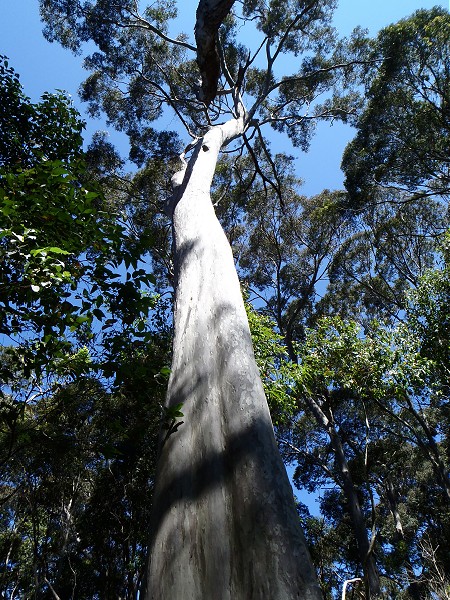
Session 3: "Stop Making my Father's House a Marketplace" (Jn 2:15)
Linda Chapman
| Download this part (pdf) |
Gospel = John 2.13-22
Pattern = Consumerism and greed
Practise = Detachment
Discipline = Fasting
Recently I went into one of the many large, enclosed shopping spaces found in cities around the world and experienced, not for the first time, a sense of profound discomfort at the 'too-muchness' of it all. The sheer volume of shops full of 'stuff' to buy can be overwhelming. The shopping centres themselves, sealed off from the natural world, become contained environments that promise to fulfil human desire through the provision of those 'things' that will make us the person that the advertisements suggest we should be. They are temples of consumerism. In some respects we have commodified creation and everything is up for sale. And our human identity is becoming that of the consumer. Indeed there may be no clearer pattern of human behaviour today, at least in the developed countries, than that of consumerism. Underlying consumerism is a kind of greed.
As one reads the Gospel passage for this week, one can feel the anger and frustration of Jesus at what the people have done to the temple. They have made the sacred profane. Jesus' cleansing of the temple is an act of purification of the holy place that it may be restored to its true purpose as a house of prayer.
If we understand the Earth as God's creation and the Creator as the Triune God who "unremittingly breathes the Spirit into his creation"[5] and is therefore present in creation, we might come to perceive the Earth as a sacred place. In this case we might ask ourselves are our human patterns of consumerism (a kind of ideology) turning our Father's house into a marketplace?
During this week of Lent we are exploring consumerism, detachment sufficiency, and fasting. It is in no way the intention of this study to suggest that we ought to renounce all our worldly possessions or a reasonable level of material way of life. Nevertheless it is important to consider the difference between needs and wants, between having enough and having too much. A spiritual practice that can help us see clearly our own addictive patterns of consumerism in light of our true needs is the practice of detachment. We can choose to be driven by consumerism or we can learn the way of letting go that Jesus teaches. Sell your possessions and follow me (Mk 10.21-22), travel lightly (Mk 6.7-10), practice detachment (Mk 1.17-20) are all teachings of Jesus who invites us not to deprivation and privation but to liberty. The freedom from the compulsion to consume liberates the human being for our true life. We find through detachment that our deepest desire is not for things but for God. We realize that we are meant to be in full relationship with the Creator and through him with all creation.
Detachment in the Christian tradition has been known as the process of becoming 'poor in spirit'. We are only free to love unconditionally when we are liberated from an attachment characterised by a kind of desperate clinging to our possessions, roles, relationships, ideas and even images of God. Detachment is not about giving up everything but is giving up anything when we are called to do so. In a world faced with the effects of over consumption, we might ask ourselves whether we are being called to contract or decrease our levels of consumption. The season of Lent is the very time to begin the practice of detachment that leads us to a sense of sufficiency—of knowing when enough is enough. The old maxim to 'live simply that all may simply live' applies here. Our personal practice of detachment and sufficiency is for the common good—the good of the whole Earth community. David Hallman in his book Spiritual Values for Earth Community notes a distinction made by Aristotle between two types of economy, namely 'chrematistics' and 'oikonomia':
Chrematistics can be defined as that branch of political economy relating to the short term manipulation of property and wealth so as to maximise short-term monetary exchange value to the owner. Oikonomia by contrast, is the management of the household so as to increase its use value to all members of the household over the long run."[6]
For chrematistics, more is always better. For oikonomia there is such a thing as enough. Our present economic system is based on the former. In God's economy and the running of the household of the Creator, it is the common good of all that matters. In the Christian tradition this has been practiced through the monastic life. The Rule of St Benedict for example, in Chapter 33, considers private ownership as an 'evil' to be uprooted and removed from the monastery. Benedict refers to Acts 4.32 that 'all things should be the common possession of all' when he exhorts the monks to have concern for the common good and life of the community rather than individualistic impulses to private ownership. In Chapter 34 of the Rule it is written: Distribution was made as each had need (Acts 4.35), exemplifying a way of life based on a healthy and balanced realization of the needs of all. When we base our economy on the maximising of individual profit no matter the cost of that to others, then it is inevitable that the most vulnerable, be they human or other-than-human, will be sacrificed to this system.
In the gospel reading Jesus drives out of the temple not only the money changers but also the innocent animals. This signifies the end of the old cultus of animal sacrifice and the start of a new worship 'in spirit and truth'. There is to be a new, living temple—the sacrificed body of Christ who makes the one true sacrifice for all. The temple or house in which we are to make our spiritual sacrifice is the whole creation interpenetrated with the triune God.
Sacrifice, however, is an uncomfortable word in this age where we are conditioned by the advertising of our culture to believe that we deserve the best and that 'me' is the most important person in town. Adopting the practice of detachment may be seen as a form of sacrifice that requires self-discipline. The ancient discipline of fasting may be a helpful way of exploring just how attached we are to our own pattern of consumption and greed (or over indulgence). The discipline of fasting may liberate us from our addictions and attachments releasing us into the larger Self to which are called (Mk 8.35).
The discipline of fasting may be taken literally to mean abstaining from food. Or it may for our purposes be seen as fasting from some other aspect of consumption; some personal attachment that we are conscious of in ourselves. The important thing to remember is that fasting is not about an unhealthy self-denial but rather a re-alignment in understanding our true needs as against our over-indulgent desires. Fasting may also be understood as the discipline of simplicity. Simplifying our lives leaves us clearer about our real needs. Living simply frees up energy to live for the other.
In this study we are encouraged to understand the whole Earth as God's house, our own patterns of over-consumption and attachments, and to observe the discipline of fasting as a way to simplify our lives for the good of the world that God so loves.
Group reflection
Spend some time considering the above and the Gospel passage. Discuss the Gospel passage first. What words and phrases in both stood out for you?

Forests have been called nature's cathedrals of God. Reflect on forests you have walked in. What were your thoughts at that time? In what ways did the experience help you to see God more clearly? In what ways was it perplexing and/or confusing?
Personal exercises
Before each of these exercises spend some time in prayer asking that the Lord reveal to you what you most need to see.
- If you are able, take the time to walk slowly through:
- A large indoor shopping mall
- An outdoor farmers' market.
Note: If you are unable to physically walk through these scenarios do it imaginatively. Visualise yourself with all the details in each of these settings. What do you notice? - Spend some time getting in touch with your most obvious, everyday, material attachments. Choose one and commit to 'fasting' from it for the rest of this period of Lent. Keep a journal of your experience of fasting. Note how you respond to letting go. Reallocate the money or time saved through 'fasting' to a worthy cause. Share your experience with the group if helpful.
Notes
5. Moltmann, J. God in Creation. Fortress Press, Minneapolis, 1993, p. 9.
6. Hallman, D. Spiritual Values for Earth Community. WCC Communications, Geneva, 2000. p. 67.